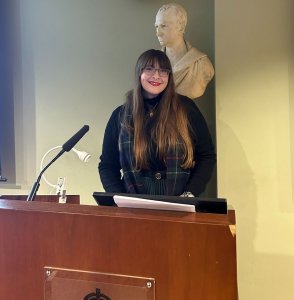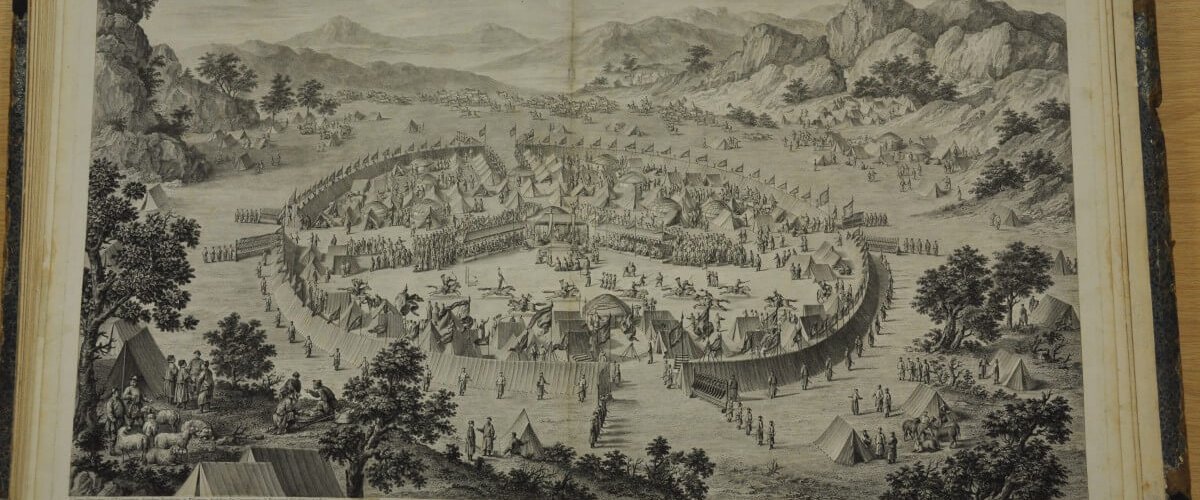Kelsey Granger – Winner of the George Staunton Prize
Last evening (Thursday 11 January) Dr. Kelsey Granger lectured on “A Tomb of One’s Own: The Changing Role of Dogs in Early Chinese Tomb Assemblages”, the topic of her article on the social history of dogs in early China which won the 2023 Sir George Staunton Prize. Her lecture last night at the Royal Asiatic Society provided us with a fascinating summary of her research. Dogs, she argues, were shaped by social and emotional considerations and used for a variety of purposes, such as a source of food, assistance in hunting or as guard dogs, and for the use of rituals and sacrifice.

Granger began by exploring the role of lapdogs in Tang China (618 CE – 907 CE) when they were closely associated with elite women and domestic spaces. Dogs were symbols of the ‘exotic’, in much the same way glass, gold, or magic were, and they represented both femininity and social prestige. But as the centuries progressed, dogs held multiple meanings and more than any other animal, they became closely associated with death. Confucius was said to have kept a dog and advised that after death, the dog should be buried in cloth; however, he emphasised that the burials ought to be frugal and not extravagant. Since dogs and horses toiled for humans when alive, they needed to be respected in death.
Granger’s lecture ended with a couple of delightful stories about heroic dogs, such as Yellow Ears and Black Dragon, who came to exemplify the morality of dogs. Some argued that the morality of dogs is superior to the morality of humans and, as Granger explains, if the gratitude of dogs is greater than humans and humans don’t show gratitude, are we really better than dogs? We would like to congratulate Dr. Kelsey Granger on winning the Staunton Prize and thank her for her intriguing lecture.
Dr Granger is the last winner of the George Staunton Prize which has been running bi-annually since 2007 to encourage early scholars to produce articles related to the history, archaeology, literature, language, religion, anthropology and art of Asia, with winning submissions being published in the Society’s Journal. This award is now superseded by some more newly-established prizes such as the Surya P. Subedi Prize for the publication of a book or article on Nepal in English in any one calendar year, and the David Morgan Memorial Prize, an annual award to the author of a Journal article published during that calendar year. Similarly, to the George Staunton Prize, this is aimed at early career scholars. Details for these prizes and our other medals and awards can be found on our ‘Awards, Prizes and Fellowships’ page.
George Thomas Staunton spent much of his working life in China. By coincidence we’ve had two researchers in the Reading Room this week looking at manuscripts and books donated by George Staunton. Staunton was not only a founding member of the Society but also it’s first benefactor in terms of donating to the Society’s collections. On 19 April, 1823, just a month after the initiation of the Society, Staunton sent a letter to the Secretary, George Henry Noehden, in which he set our his aim:
“Having in the course of my residence in China formed a considerable Collection of Chinese printed Books and also of Manuscript Dictionaries, and other works of Europeans, calculated to assist the Student in the acquisition of a knowledge of the language and literature of the Chinese, I feel confident that I cannot more effectively promote the object… than by a respectful offer of the Collection to the Asiatic Society.” (Note, at this time, the Society had yet to receive royal patronage.)

Sadly we no longer have the original letter but a copy of it was made in the Donations register. The Society gratefully accept his donation which is summarised under headings within the Donations register. They included 15 works of Chinese classics, 22 dictionaries, 25 works on arts and science and 23 works of poetry, plays or novels. In total the donation consisted of 186 works equalling 2610 volumes of material. Staunton continued to donate books, manuscripts and objects connected with China and the wider fields of his interest throughout most of the rest of his life, his final donation being his own ‘Memoirs of the Chief Incidents of the Public Life of Sir George Thomas Staunton, Bart’ which he had privately printed in 1856.

Much of this material has since been donated to other institutions. The majority of our objects were donated at an early point in the Society’s history and many of the Chinese books were donated to Leeds University in 1963 for their new department of Chinese studies. These are still available at the University’s Brotherton Library and we hold a list of the volumes for interested researchers. However a number of works are still within our collections including the Chinese-Latin dictionaries which featured in our Extraordinary Endeavours Exhibition.
We have other dictionaries, phrase books, dynastic tables, Chinese letters and documents and a volume on the ‘Import taxes at Canton’ written in English and French within our manuscript collection. We also have a copy of the Sānguó Yănyì or Romance of the Three Kingdoms – a fourteenth century historical novel attributed to Luo Guanzhong. The version in our collection was handwritten in Latin and bears marks of corrections.

One of the fascinating books, which remains in our collections, consists of a series of engravings, Suite des seize estampes représentant les conquetes de l’empereur de la Chine. These were commissioned by the Qianlong Emperor in 1765-66. The engravings were directed by C.N. Cochin from drawings made by Giuseppe Castiglione, a Jesuit priest, who was in service as an artist to the Emperor. Ten engravers worked on the project. The result was a hundred copies, most of which were sent to China. A few were reserved for the French royal family. According to a label within our volume it is thought that the set of engravings within our collections came from the Lichtenstein collection. The book is one of our elephant volumes measuring 65 cm. x 52 cm.

Next Thursday, 18th January 2024, 6.30 pm, we will be honouring Professor Francis Robinson by celebrating the launch of his festschrift edition of the Journal. Professor Robinson has served many years in the broader field of Asian studies as well as being an active member of the Royal Asiatic Society since 1984, including two periods as its President . We look forward to this event and hope you may be able to join us.

